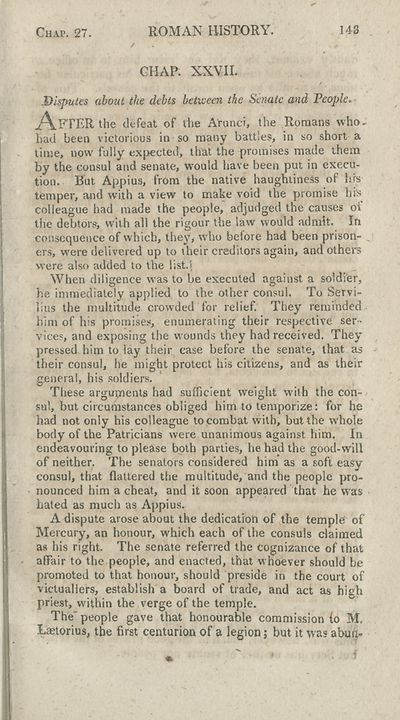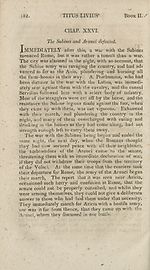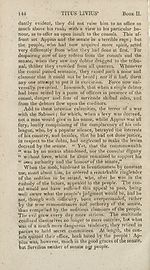Download files
Complete book:
Individual page:
Thumbnail gallery: Grid view | List view

Chap. 27.
ROMAN HISTORY.
143
CHAP. XXVII.
.Disputes about the debts between the Senate and People.
AfFER the defeat of the Arunci, the Romans who.
had been victorious in so many battles, in so short a
time, now fully expected, that the promises made them
by the consul and senate, would have been put in execu¬
tion. But Appius, from the native haughtiness of hrs
temper, and with a view to make void the promise his
colleague had made the people, adjudged the causes oi
the debtors, with all the rigour the law would admit. In
consequence of which, they, who before had been prison- _
ers, were delivered up to their creditors again, and others
were also added to the list.;
When diligence was to be executed against a soldier,
he immediately applied to the other consul. To Servi-
lius the multitude crowded for relief. They reminded
him of his promises, enumerating their respective ser¬
vices, and exposing the wounds they had received. They
pressed him to lay their case before the senate, that as
their consul, he might protect his citizens, and as their
general, his soldiers.
These argupoents had sufficient weight with the con¬
sul, but circumstances obliged him to temporize: for he
had not only his colleague to combat with, but the whole
body of the Patricians were unanimous against him. In
endeavouring to please both parties, he had the good-will
of neither. The senators considered him as a soft easy
consul, that flattered the multitude, and the people pro¬
nounced him a cheat, and it soon appeared that he was
hated as much as Appius.
A dispute arose about the dedication of the temple of
Mercury, an honour, which each of the consuls claimed
as his right. The senate referred the cognizance of that
affair to the people, and enacted, that whoever should be
promoted to that honour, should preside in the court of
victuallers, establish a board of trade, and act as high
priest, within the verge of the temple.
The' people gave that honourable commission (o M.
Laetorius, the first centurion of a legion j but it was abun-
ROMAN HISTORY.
143
CHAP. XXVII.
.Disputes about the debts between the Senate and People.
AfFER the defeat of the Arunci, the Romans who.
had been victorious in so many battles, in so short a
time, now fully expected, that the promises made them
by the consul and senate, would have been put in execu¬
tion. But Appius, from the native haughtiness of hrs
temper, and with a view to make void the promise his
colleague had made the people, adjudged the causes oi
the debtors, with all the rigour the law would admit. In
consequence of which, they, who before had been prison- _
ers, were delivered up to their creditors again, and others
were also added to the list.;
When diligence was to be executed against a soldier,
he immediately applied to the other consul. To Servi-
lius the multitude crowded for relief. They reminded
him of his promises, enumerating their respective ser¬
vices, and exposing the wounds they had received. They
pressed him to lay their case before the senate, that as
their consul, he might protect his citizens, and as their
general, his soldiers.
These argupoents had sufficient weight with the con¬
sul, but circumstances obliged him to temporize: for he
had not only his colleague to combat with, but the whole
body of the Patricians were unanimous against him. In
endeavouring to please both parties, he had the good-will
of neither. The senators considered him as a soft easy
consul, that flattered the multitude, and the people pro¬
nounced him a cheat, and it soon appeared that he was
hated as much as Appius.
A dispute arose about the dedication of the temple of
Mercury, an honour, which each of the consuls claimed
as his right. The senate referred the cognizance of that
affair to the people, and enacted, that whoever should be
promoted to that honour, should preside in the court of
victuallers, establish a board of trade, and act as high
priest, within the verge of the temple.
The' people gave that honourable commission (o M.
Laetorius, the first centurion of a legion j but it was abun-
Set display mode to:
![]() Universal Viewer |
Universal Viewer | ![]() Mirador |
Large image | Transcription
Mirador |
Large image | Transcription
| Antiquarian books of Scotland > Curiosities & wonders > Titus Livius' Roman history > (147) |
|---|
| Permanent URL | https://digital.nls.uk/115984913 |
|---|
| Description | Thousands of printed books from the Antiquarian Books of Scotland collection which dates from 1641 to the 1980s. The collection consists of 14,800 books which were published in Scotland or have a Scottish connection, e.g. through the author, printer or owner. Subjects covered include sport, education, diseases, adventure, occupations, Jacobites, politics and religion. Among the 29 languages represented are English, Gaelic, Italian, French, Russian and Swedish. |
|---|

